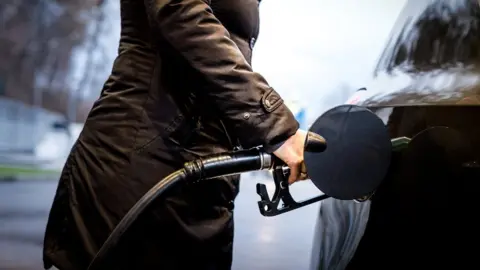Diesel car sales 'to plummet to 5% by 2030'
 Getty Images
Getty ImagesDiesel-powered vehicles are expected to fall to just 5% of the EU car market by 2030, a new study indicates.
Worries about air quality and emissions standards have already hit diesel car sales, but consulting firm AlixPartners says the decline will accelerate.
Diesels' share of the European market has already fallen from 52% to 45% between 2015 and 2017, the firm says.
However, the shift away from diesel will make it even harder for the EU to meet CO2 emissions targets, it adds.
Diesel was promoted as more environmentally-friendly than petrol as part of EU efforts to reduce greenhouse gas emissions, and carbon dioxide (CO2) in particular.
While diesel fuel contains slightly more carbon, overall CO2 emissions of the average diesel car are lower.
However, diesel engines generally produce higher levels of nitrogen oxides and of particulates - tiny pieces of soot that can enter the lungs.
"The EU fleet needs to deliver a 4.6% reduction [in CO2] per year through to 2021. However, in 2017, overall EU CO2 increased 0.3g/km," said the study.
AlixPartners said carmakers were "facing a technology choice", with electric and hybrid vehicles "the only answer" to the challenge of reducing emissions.
Public confidence in diesel was also dented by the Volkswagen emissions scandal, when it emerged in 2015 that diesel cars had been fitted with devices designed to cheat emissions tests.
In the UK, diesel car sales fell by 23.6% in May compared with the same month in 2017, according to the Society of Motor Manufacturers and Traders (SMMT).
It was the 14th month in a row that diesel's UK market segment had shrunk. In 2017, demand for new diesel cars fell 17%.
Higher taxes on diesel vehicles may have affected demand in the UK too.
In the November 2017 Budget, the government announced a levy on new diesel vehicles that failed to meet the latest emissions standards. The first-year road tax increase for diesel cars came into effect in April and will apply until about 2021.
